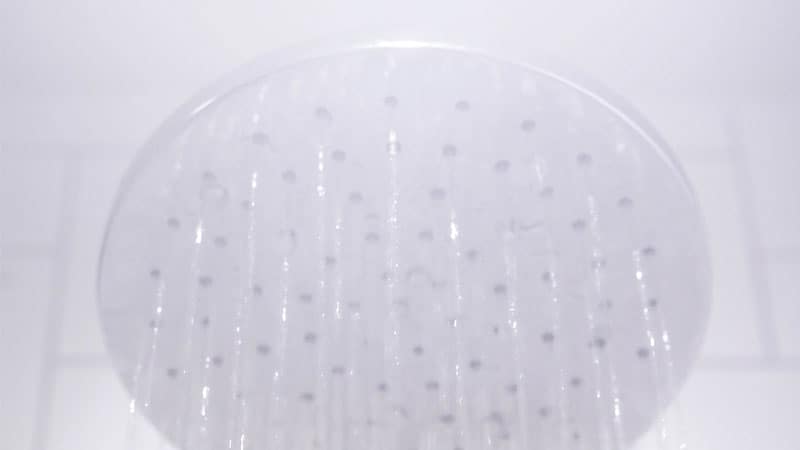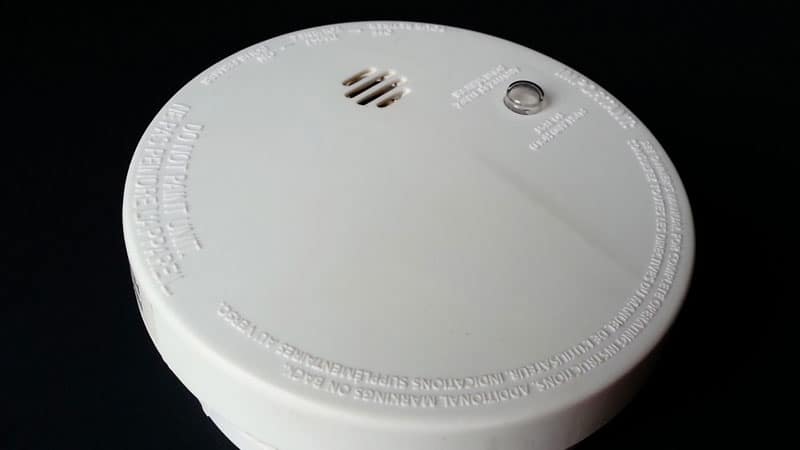Smoke alarms are everywhere and serve an important purpose. But there can be nothing more embarrassing than having a smoke alarm go off in the middle of the night or while you’re cooking up a steak. Even worse if it goes off when you’re not home and your neighbors have to put up with a smoke alarm for a few hours. But can shower steam trigger a smoke alarm?
Steam and many other common particles will set off a smoke alarm. You should be mindful of heat sources, dust, water vapor, and steam in areas where you will install a smoke alarm.
I’ll explain how smoke detectors work and some common issues that people face with them. I’ll go through some strategies on reducing false positives as well as some dos and don’ts regarding how best to deal with sensitive smoke alarms. Smoke alarms play an important role in safety and so should be installed where they can do a great job of detecting while not going off on false positives all the time.
Can Steam From a Bathroom Set Off a Smoke Detector?

First, it is important to understand that there are two types of smoke alarms. The most common are referred to as ionization detectors. They’re generally a lot cheaper than the other type, called a photoelectric detector.
Ionization detectors consist of two plates that are electrically charged and use a small amount of americium-241, a safe radioactive material. That material charges the particles in the air and circulates air between the plates. As smoke enters this area, the flow of ions is disrupted, which trips the alarm.
Photoelectric detectors operate via aiming a light source into a specific area within the detector. By default, this light beam is not aimed at this area, which contains the sensors. However as smoke enters the chamber, this causes the light to reflect and hit the sensor. This is the signal for the alarm to go off.
There are even products referred to as dual-sensor fire alarms that contain both types of technology. Due to the way the individual sensing operates, they are better at detecting certain fires. Smoldering fires are detected better by photoelectric, whereas ionization detectors will alert on flaming fires better.
As steam particles behave in a very similar manner as smoke particles this will cause many false positives. This is particularly the case for photoelectric detectors as the sensor can be activated through steam particles just as easily as smoke particles as both will divert the light.
Although less common, steam can also impact the ionized air inside the ionization detectors as well, causing a false positive. This means that steam will set off both types of smoke alarms.
Steam means heat changes, condensation, a rise in humidity, and just generally more particles in the air. All of this can contribute to false positives.
Can Condensation Set Off a Smoke Alarm?
The buildup of condensation inside any type of electronics can cause issues. Not only can this mess with the electrical circuits and batteries, but also condensation can increase the air pressure inside the sensor and raise the heat or humidity levels, causing the alarm to go off.
Why Does Shower Steam Set Off a Smoke Alarm?

Smoke detectors are meant for the safety of the place in general and are geared to be sensitive to ensure that even small amounts of smoke from a fire can set them off. This of course however opens up the devices to going off for non-smoke-related issues that we don’t care about.
When the steam is let out from sources like a shower head, there are tiny droplets of hot air within the steam, which increase the air’s overall humidity content. This can be captured by the detecting system and can easily set it off. High humidity, particularly in excess of 85%, is likely going to cause a lot of false positives.
How Do You Stop Steam Causing The Fire Alarm From Going Off?
Even just a small amount of physical distance between the detector and the source (such as a shower) can make a big difference between your siren going off or not.
Low batteries in your smoke detector can also be the cause. As they start to die, strangely that increases the chances of false positives. This is even more common with the photoelectric detectors because the light source inside the unit becomes weak and is more likely to activate the sensor accidentally.
Most smoke detectors are highly sensitive to rising levels of heat, particularly ones in hotels and other areas. Thus having steam or heat directed right at a smoke detector, say if it is just above the door to the bathroom, are going to cause many false positives.
While many people may just cover their smoke detector, this is a really bad idea. Smoke detectors are there to help save your life and covering them may even be illegal depending on where you live. It is best to contact maintenance or legally move it to a more ideal location.
You shouldn’t install one in or just outside of the bathroom or cooking area as steam from the shower or from cooking food can set off a smoke detector. Increasing ventilation by getting quality exhaust fans near these problematic sources to vent any hot air or high humidity air away will be a good start.
Can Smoke Detectors Tell The Difference Between Smoke And Steam?
All smoke alarms are sensitive to small, airborne particles. This includes both steam and smoke. While there is the technology inside smoke detectors that is meant to try and only detect smoke, the similarity of these substances means smoke detectors will often have false positives.
For example, photoelectric detectors can mistake dust for smoke because they can reflect light, just like smoke particles.

